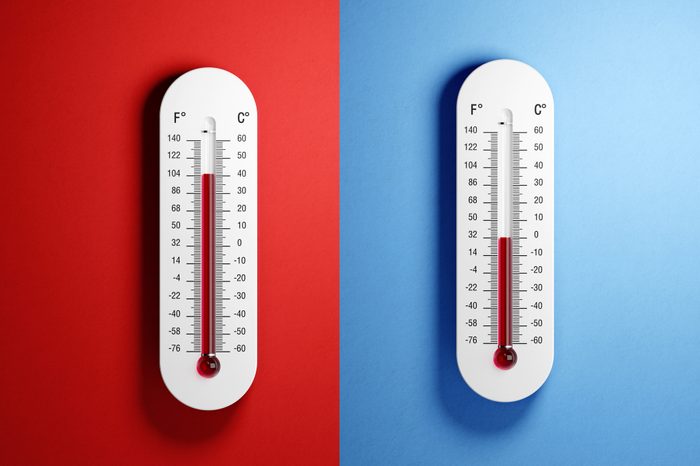
What is asthma?
More than 25 million Americans have asthma—a condition that inflames and narrows the airways in the lungs. Although the National Heart, Lung, and Blood Institute says the exact cause of asthma isn’t known, experts do know about various triggers that cause asthma symptoms including shortness of breath, wheezing, and coughing. Here’s how to avoid the surprising asthma triggers you may not know.

Hormones
Asthma is more common among women than men, which might be related to a correlation between asthma and the hormones estrogen and progesterone, says Payal Patel, MD, a member of the American Academy of Allergy Asthma & Immunology. Asthma may get worse before and during your period or improve during pregnancy, Dr. Patel says. “This goes along with the theory that oral contraceptives can improve lung function due to reduced fluctuations in hormone levels,” she says. These are other unusual menstrual cycle symptoms to watch for.

Hypoallergenic pets
Just because a cat or dog doesn’t shed doesn’t mean you’re safe from their irritants. Allergens can be found in urine and saliva, in addition to dander, Dr. Patel says. “Even pets labeled ‘hypoallergenic or nonshedding’ can trigger asthma,” she says. Don’t fall for these common myths about allergies.

Weather
“Some people have induced symptoms by cold, dry air in wintertime, while others find hot, humid days pose a challenge in controlling asthma,” Dr. Patel says. Cold and dry air is most commonly a problem in people with exercise-induced asthma. Though the reason is unclear, it could be that rapid breathing in a cold, dry environment causes water loss, which leads to inflammation and constriction, she says.

Anti-inflammatory drugs
Anti-inflammatory medications such as aspirin and ibuprofen can trigger asthma among people sensitive to those medications, Dr. Patel says. The reason isn’t fully clear, but some evidence suggests that people sensitive to those drugs metabolize the fatty acid arachidonic acid abnormally. When they take anti-inflammatory medications, this leads their bodies to actually produce more inflammatory molecules, which causes their lungs to constrict. “People who have those problems need to be evaluated very carefully because that kind of response can be very serious or life-threatening,” says Clifford Bassett, MD, founder and medical director of Allergy and Asthma Care of New York. Find out how to spot the symptoms of asthma as an adult.

Stress
When you’re stressed, you might have more frequent and more severe asthma attacks. The mechanism isn’t totally understood, but it’s believed that when the body has low or ineffective levels of cortisol, the stress hormone isn’t able to decrease inflammation, according to Dr. Patel. “It’s important to recognize this relationship and seek ways to decrease daily stress,” she says. Try one of these tips for managing stress.

Highways
Air pollution and car exhaust can prompt a reaction in people sensitive to those triggers. “Exercise during high pollution days or near busy highways should be avoided,” Dr. Patel advises. She recommends checking the pollution level on airnow.gov and then hitting the gym instead of running outside if the air quality is bad. To breathe better quality air, look into buying an air purifier for asthma.

Preservatives
Sulfites, used as preservatives in products like wine, shrimp, dried fruit, and lemon juice, can irritate the lungs and cause a reaction in about 5 to 10 percent of people with asthma, Dr. Bassett says. That’s likely because during digestion, the stomach vaporizes sulfites into droplets that go through the throat and into the lungs, causing irritation, he says.

Beta-blockers
Beta-blocker medications used to treat high blood pressure can worsen lung function, which is especially worrisome for people with severe or uncontrolled asthma, Dr. Patel says. The side effects won’t happen with everyone, but keep aware if you’re thinking of starting a prescription. “They’re advised to be used with caution because we don’t know which patient will react and have an attack,” Dr. Patel says.

Indoor pools
Swimming is typically considered a good sport for asthmatics because warm, moist air near water usually doesn’t cause asthma attacks. The exception? Indoor pools. “We’ve largely seen problems in municipal pools that don’t have correct ventilation,” according to Dr. Bassett. “We don’t typically see it in outdoor situations, because ventilation is better.”

ACE inhibitors
A small percentage of people could end up with a chronic cough when they take ACE inhibitors for high blood pressure. “It can occur after they’ve been on for more than a year, and it can go on for another month,” Dr. Bassett says. If you’re taking an ACE inhibitor and are worried about a cough that won’t go away, talk to your doctor.

Outdoor critters
As if you needed another reason to stay away from cockroaches, the bugs’ droppings can trigger asthma. Rodents can also trigger asthma, whether an inner-city rat or a mouse in the country, Dr. Patel says.

Long-distance runs
It may not come as a surprise that exercise can trigger asthma, but some sports are worse than others. Activities such as long-distance running, basketball, and soccer that require you to keep moving for long periods are more likely to cause an attack than ones that involve short energy bursts, like football and baseball, Dr. Bassett says. Here’s how one woman keeps exercising despite her exercise-induced asthma.